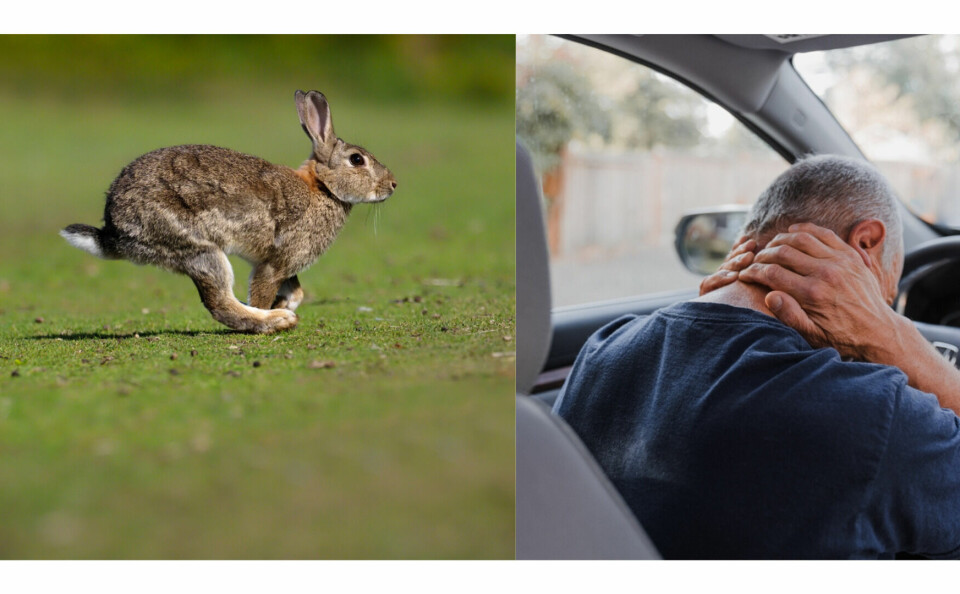Petit lapin, coup du lapin: 6 commonly used French rabbit expressions
A potential new penalty for missing a doctor’s appointment has also been nicknamed la taxe lapin - we explain why
Coup du lapin is the French term for whiplash
Pic 1: Erni / Shutterstock Pic 2: Tinatin / Shutterstock
There are many phrases in French that use the word lapin, meaning rabbit, to describe a range of situations. We have picked six which are often used in everyday French.
1. Poser un lapin
The new Prime Minister Gabriel Attal says he wants to impose a penalty on people who miss a doctor’s appointment - leading to the plan being nicknamed la taxe lapin (the rabbit tax).
Read more: Senators vote in favour of no-show fees for GP appointments in France
This comes from the expression poser un lapin, which means to miss an appointment without warning the other person. Its literal translation is to ‘place a rabbit’.
If you are stood up by a friend, you can say il m’a posé un lapin.
It is thought to have appeared around 1890 among students - previously faire poser (‘make place’) meant to make someone wait.
The lapin part is thought to have originated from prostitutes who used it to refer to clients who left without paying. It evolved to generally refer to someone who would leave without paying in any context.
The two expressions later combined to mean someone who would not show up to an agreed rendezvous.
2. Ne pas valoir un pet de lapin
Literally meaning not being worth a rabbit’s fart, this expression is used to mean something that has no value.
There is not an explanation for why a rabbit’s flatulence was chosen over another animal’s. In the past, the cuckoo was used rather than the rabbit but rabbit became more popular over time.
The turn of phrase is slightly rude so it is not recommended to use it in a professional or formal context.
If a friend comes to you with a nonsensical business idea, you can rebuke them by saying: a ne vaut pas un pet de lapin (it is not worth a rabbit’s fart).
3. Coup du lapin
This expression has a few different meanings.
Firstly, it is the term for whiplash, the injury usually sustained in cars when sudden braking leads to a person’s head jerking forward or back and damaging their neck.
It is also the term used to refer to a rabbit punch. This is a punch to the back of the head or neck which can be extremely dangerous and often fatal, because of damage to the spinal cord.
The term originated from the technique hunters used to kill rabbits, with a quick, sharp blow to the back of the head.
It can also be used to mean betraying or stabbing someone in the back, related to the previous use.
If you say, je me suis fait un coup du lapin (literally, ‘I gave myself a rabbit hit’), it will be understood as you suffering from whiplash.
4. Mon petit lapin
My little rabbit is a term of endearment in French. It can be used for romantic partners or for children, or anyone else you would like to give an affectionate nickname to.
When your partner or child comes home from a long day, you can greet them by saying ça va mon petit lapin? (How are you my little rabbit?)
5. Courir comme un lapin
This translates to running like a rabbit.
It can be used to refer to fleeing but it generally means to run very fast.
If your tennis opponent keeps getting to balls you do not expect him to, you can tell him tu cours comme un lapin.
It is not rude but is generally an informal expression. You can also replace rabbit with zebra (zèbre) for the same meaning.
The expression comes from the fact that rabbits are very fast and hard to catch when being chased.
6. Prendre pour un lapin de six semaines
If someone is taking you for a fool or treating you like an idiot, then il te prend pour un lapin de six semaines (they are taking you for a six-week old rabbit).
The expression is similar to ‘being born yesterday’ in the sense of naivete.
It specifically refers to six weeks because it is typically at six weeks that a mother rabbit will stop nursing its young. Therefore, the baby rabbits are likely to eat and swallow anything whatsoever to fight hunger.
It is often used to specifically refer to someone hiding their intentions.
The expression is a more polite version of prendre pour un con, with con being a swear word to refer to an idiot.
The next time someone gives you an excuse that is clearly a lie, you can say arrete de me prendre pour un lapin de six semaines (stop taking me for a six-week old rabbit).
Read more
Five French phrases with same English meaning - just swap the animal
French phrases that feature dogs (and some cats)
























